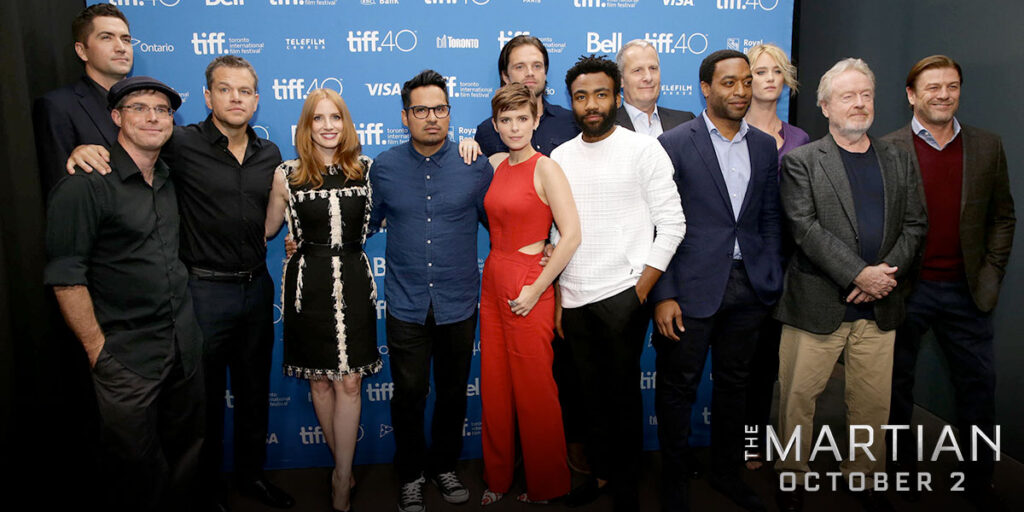
This month in film history, back in 2015, The Martian premiered at both the Toronto International Film Festival and the New York Film Festival, wowing early audiences with its visceral story and harrowing premise about an astronaut abandoned on Mars. The Martian landed in theatres in October, earned seven Oscar nominations (including Academy Award for Best Adapted Screenplay,) and became the 8th highest-grossing film of that year.
While Drew Goddard (Lost, Buffy The Vampire Slayer, and World War Z) wrote the screenplay, the film was based on the 2011 novel by Andy Weir. It was the science fiction author’s debut novel. Talk about a success story!
No, seriously. We’re going to talk about it.
The Martian originally began in 2009 as a series of self-published chapters on Andy Weir’s personal blog. In 2011, he uploaded the full story to Amazon Kindle and independently sold the ebook for only $0.99. I can tell you from experience, that’s where most authors start; with an ebook on Amazon, listed at $0.99, begging for reviews, marketing it all by themselves. It’s a soul-draining endeavor, but Cinderella stories do happen. Case in point…

The Kindle edition of The Martian had lift-off. Like a rocket, it blasted to the top of Amazon’s best-selling science-fiction list in record time. Andy Weir sold 35,000 copies in three months, which is reportedly more than had been previously downloaded on Amazon for free. Just as all eyes had been on Neil Armstrong when he landed on the moon, all eyes were on Andy Weir as he landed his first publishing deals.
Podium Publishing, which specialized in audiobooks, bought the audio rights in early 2013. The next year, the audiobook of The Martian won an Audie Award in the Science Fiction category. Crown Publishing bought the print rights for over $100,000 and re-released the novel in 2014. Meanwhile, 20th Century Fox secured the movie rights and began producing a film adaptation during the book’s rise to fame.
One small step for Weir quickly led to one giant leap for Weir-kind. Both paperback and hardcover copies of The Martian reached the New York Times Bestseller list in 2014. The book then rose to the very top position on the esteemed list in 2015, uncoincidentally around the same time the movie came out.
According to his Goodreads profile, the success of The Martian allowed Weir to live out his dream of writing full time. A sci-fi fairytale, indeed. If you haven’t heard of Goodreads before, it’s basically the literary equivalent of RottenTomatoes.

On Goodreads, The Martian has an average rating of 4.4 out of 5 stars, has received 901,483 total ratings, and has 76,381 reviews. 97% Of people who reviewed or rated the book on Goodreads ‘liked’ it. Now, that’s impressive, because Goodreads is full of critics just as ruthless (or even more so) than RottenTomatoes. Speaking of RottenTomatoes, The Martian film boasts a 91% Tomatometer, 383 reviews, and a 91% audience score with 100,000+ audience reviews. I tried to find the exact number, but apparently, there are too many for the site to count (or, at least, to list.)
My point is, The Martian is widely considered a good book, AND a good movie, AND a good adaptation, and that’s rarer than a shining star on either review site. Think about all the movie adaptations that didn’t achieve this unicorn status. Avatar: The Last Airbender. Eragon. The Cat in The Hat. These are almost universally deemed terrible adaptations. So what did they do wrong while The Martian did right? How did Ridley Scott and Drew Goddard transfer the book’s success to the screen?
In my opinion, the recipe for The Martian’s success boils down to three crucial ingredients; special effects, story, and performance.
First, the special effects. Andy Weir went to the ends of the Earth to conduct extensive research so that his book would be as realistic as possible, studying orbital mechanics, astronomy, and the history of human spaceflight. When the movie for The Martian was announced, “expectations were high among the book’s avid fans that the movie retains the book’s scientific realism,” cites a Physics Today article. The article advocates that the movie met those expectations. The article’s author conducts a thorough review on the science behind both the film and the book, praising The Martian for its accuracies –including getting the characteristics of the sand and gravity correct.
The special effects in the movie were not overly spectacular. They were simply believable, and that’s exactly what they needed to be. Nothing more. Many audience members, fans and newcomers alike, expressed appreciation that the filmmakers did not indulge in fanciful CGI. The CGI existed for the story and did not attempt to upstage it.
That leads directly to my next point. At its simplest core, the story of The Martian is about overcoming challenges using ingenuity and the sheer will to survive. The premise is eye-catching, curiosity-sparking, and heart-wrenching. “An astronaut is stranded alone on Mars and must improvise in order to survive.” That sentence sure packs a punch. We know ‘who,’ ‘what,’ and ‘where,’ but we also wonder ‘how,’ ‘why,’ and ‘will?’ It’s concise and effective and will make almost anybody want to read or watch that story.
In a review on the site, The Numbers, C.S. Strowbridge writes “The Martian is a near-perfect movie. The story is fabulous with an excellent focus on science and without any extraneous elements that most Hollywood films would shove into a script, like a romantic subplot (…) There’s none of that here. The drama and tension come from the situation and the ingenuity needed to solve the problem. Additionally, The Martian has one of the best casts of any movie I’ve seen all year.”
I completely agree. The performance of the cast is truly what brought realism and life to the characters involved in this riveting and thought-provoking tale. Matt Damon utterly sold the character of Mark Watney. He was likable, authentic, and funny, all of which the character needed to be because the character was also all of those things in Andy Weir’s novel.

In writing, we are taught to anchor readers to characters. Granted, the plot needs to be interesting, but the characters are what the readers bond with. In movies, the same is true. Matt was effortlessly easy for the audience to bond with, and many viewers believed he did justice in representing the character.
But it wasn’t just Matt Damon who did the heavy lifting. Jeff Daniels, Mackenzie Davis, Jessica Chastain, Kristen Wiig, Michael Peña, Kate Mara, Sean Bean, Sebastian Stan, and Chiwetel Ejiofor also achieved honest and genuine performances. Some of those actors are explicitly known for their authentic acting style, and I think the casting team (Carmen Cuba and Nina Gold) deserve a round of applause.

It’s hard to argue with C.S. Strowbridge when he states, “This could be the best looking and most realistic space program movie of all time.” I would even be so bold as to claim The Martian might be the best book-to-movie adaptation of all time.
Do you agree? Is there another book-to-movie adaptation you’d like to advocate for? What is the worst book-to-movie adaptation of all time?
Let us know in the comments!







